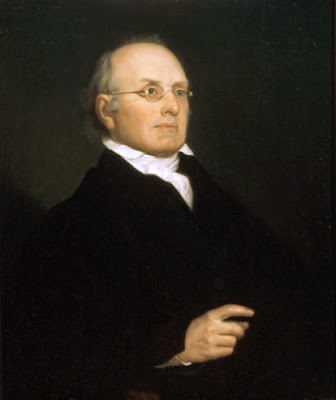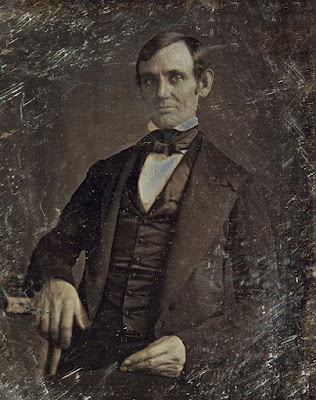Joseph Story was a U. S. Supreme Court justice, appointed by President James Madison
In 1812, President James Madison appointed a new justice to the United States Supreme Court. His name was Joseph Story, the author of a three-volume work that I would like to read someday. The work is simply called “Commentaries on the Constitution of the United States.” Story had been a Supreme Court justice for more than 20 years, when he published this three-volume work in 1833. He did not leave the court until his death in 1845.
Joseph Story
One of the people to recommend Joseph Story was the future president Abraham Lincoln
One of the people to recommend Justice Story was the future president Abraham Lincoln. Before Lincoln became president, he had served in the United States House of Representatives. While serving there in 1848, Lincoln gave his “Speech in United States House of Representatives on Internal Improvements” (20 June 1848). Lincoln quoted a famous jurist named James Kent, whom Lincoln refers to here as “Chancellor Kent.” But the quotation from “Chancellor Kent” also contains a quotation of its own from Joseph Story’s “commentaries on the constitution of the United States” (with the capitalization being Kent’s own). With that in mind, here is the relevant portion of the 1848 Abraham Lincoln speech:
Abraham Lincoln, who really was clean-shaven in his youth
Lincoln quoted a passage from James Kent’s “Commentaries on American Law” …
“In 1826, Chancellor Kent first published his Commentaries on American Law. He devoted a portion of one of the lectures to the question of the authority of congress to appropriate public moneyes for internal improvements … In 1844 the chancellor published a new edition of his commentaries, in which he adds some notes of what had transpired on the question since 1826 … As what Chancellor Kent seems to consider the sum of the whole, I read from one of the notes:
Chancellor James Kent
… which used Story’s “Commentaries on the Constitution” as a source for its arguments
“‘Mr. Justice Story, in his commentaries on the constitution of the United States, vol. ii p 429-440, and again p 519-538 has stated at large the arguments for and and against the proposition, that congress have a constitutional authority to lay taxes, and to apply the power to regulate commerce as a means directly to encourage and protect domestic manufactures; and without giving any opinion of his own on the contested doctrine, he has left the reader to draw his own conclusions. I should think, however, from the arguments as stated, that every mind which has taken no part in the discussions, and felt [no] prejudice or teritorial bias on either side of the question, would deem the arguments in favor of the congressional power vastly superior.’” (Source: “Speech in United States House of Representatives on Internal Improvements,” 20 June 1848)
Chancellor James Kent
Lincoln then draws the necessary conclusion, and praises James Kent in the process
His quotation from Kent thus concluded, Lincoln then adds: “It will be seen, that in this extract the power to make improvements is not directly mentioned; but by examining the context, both of Kent and Story, it will be seen that the power mentioned in the extract, and the power to make improvements are regarded as identical.” (Source: Same as above) Lincoln then proceeds to praise Chancellor Kent, saying that “He was one of the ablest and most learned lawyers of his age, or of any age. It is no disparagement to Mr. Polk, nor, indeed to any one who devotes much time to politics, to be placed far behind Chancellor Kent as a lawyer. His attitude was most favorable to correct conclusions. He wrote coolly, and in retirement. He was struggling to rear a durable [an enduring] monument of fame; and he well knew that truth and thoroughly sound reasoning were the only sure foundations. Can the party opinion of a party [the] president, on a law question, as this purely is, be at all compared, or set in in opposition to that of such a man, in such an attitude, as Chancellor Kent?” (Source: Same as above) One presumes that Lincoln would not have said this, if he disapproved of Mr. Kent’s aforementioned citation to Story’s “Commentaries.” Lincoln must have considered this citation to be compelling, if he was willing to use it himself on the floor of Congress.
Joseph Story
Lincoln advised an aspiring lawyer to read “Story's Equity” …
In 1858, a man named James T. Thornton would later write a letter to Abraham Lincoln. Lincoln was now a former Congressman, but he was not yet a presidential candidate. In it, Mr. Thornton recommended an aspiring lawyer named John H. Widner, and asked Lincoln to instruct him about the law. In that same year, Lincoln answered him, saying:
“I am absent altogether too much to be a suitable instructer for a law-student. When a man has reached the age that Mr. Widner has, and has already been doing for himself, my judgment is, that he reads the books for himself without an instructer. That is precisely the way I came to the law. Let Mr. Widner read Blackstone's Commentaries, Chitty's Pleading's---Greenleaf's Evidence, Story's Equity, and Story's Equity Pleading's, get a license, and go to the practice, and still keep reading. That is my judgment of the cheapest, quickest, and best way for Mr. Widner to make a lawyer of himself.” (Source: Letter to James T. Thornton, 2 December 1858)
Simon Greenleaf, whose work “Treatise on the Law of Evidence” is mentioned above
… and “Story's Equity Pleading's” (among other works)
As you can see, Lincoln recommends several books here, but two of them are “Story's Equity” and “Story's Equity Pleading's.” The “Story” referred to here is undoubtedly Joseph Story, who did indeed write both “Commentaries on Equity Jurisprudence” and “Equity Pleadings” in the 1830’s.
Sir William Blackstone, whose “Commentaries on the Laws of England” are mentioned above
Lincoln advised another aspiring lawyer to read “Story's Equity” etc.
In 1860, John M. Brockman asked Lincoln what is “the best mode of obtaining a thorough knowledge of the law.” Now a presidential candidate, Lincoln answered in September 1860, two months before he was first elected president of the United States. Lincoln’s answer is as follows: “The mode is very simple, though laborious, and tedious. It is only to get the books, and read, and study them carefully. Begin with Blackstone's Commentaries, and after reading it carefully through, say twice, take up Chitty's Pleading, Greenleaf's Evidence, & Story's Equity &c. in succession.” (Source: Letter to John M. Brockman, 25 September 1860) Thus, we again find mention of “Story's Equity,” along with “&c.” (an alternative way of writing “etc.”). Judging from Lincoln’s previous letter to John T. Thornton (quoted above), the “&c.” may have been meant to include “Story's Equity Pleading's” – which Lincoln had mentioned in that previous letter, along with all of the other works mentioned above.
Bust of Joseph Story
But Jefferson Davis would criticize Story’s views on states’ rights …
But after Lincoln’s death, Joseph Story would be severely criticized by Lincoln’s former enemy Jefferson Davis in 1881. By that point, the Confederacy had been defeated in the American Civil War, and Jefferson Davis had already been its one and only president. Jefferson Davis would defend secession from the United States in his memoir “The Rise and Fall of the Confederate Government.” Jefferson Davis gives some limited praise for Joseph Story in this memoir, but also offered some criticism of his views on states’ rights – a subject that was a hot topic during the Civil War. Indeed, many Confederates said that their motivation for rebelling against United States authority was “states’ rights.”
Jefferson Davis
… praising Story only once in his memoirs …
The passage where Davis offers limited praise of Joseph Story is as follows: “‘The term ‘sovereign’ or ‘sovereignty,’’ says Judge Story, ‘is used in different senses, which often leads to a confusion of ideas, and sometimes to very mischievous and unfounded conclusions.’ Without any disrespect for Judge Story, or any disparagement of his great learning and ability, it may safely be added that he and his disciples have contributed not a little to the increase of this confusion of ideas and the spread of these mischievous and unfounded conclusions.” (Source: “The Rise and Fall of the Confederate Government,” Volume I, Part II, Chapter VIII)
Jefferson Davis
… and criticizing Story every other time that he (Davis) mentioned Story
This is the most praise for Joseph Story that you will find anywhere in Jefferson Davis’s memoirs. Even in this paragraph where he acknowledges Story’s “great learning and ability,” he blames him for a “confusion of ideas” and the spread of “mischievous and unfounded conclusions.” Other passages are even more critical of “Judge Story,” particularly with regards to his position about the power of the federal government over the states. There was plenty in Story’s writings to offend rabid “states’ rights” advocates like Mr. Davis, and so Jefferson Davis attacks his dead adversary multiple times in his memoir. A section of one of his chapters is even entitled “Mistake of Judge Story.” (See the full title of Volume I, Part II, Chapter IV for Davis’s own summary of that section.)
Abraham Lincoln
Conclusion: Lincoln recommended Story, while Jefferson Davis criticized him
Thus, Abraham Lincoln recommended Joseph Story, while Jefferson Davis criticized him. Even in the passage where Jefferson Davis offered limited praise of “Judge Story,” he mixed it with some severe criticisms, showing his vehement disagreements with Joseph Story over “states’ rights.”
Footnote to this blog post:
Two of the other authors recommended by Lincoln in the above passages were Simon Greenleaf and Chancellor James Kent. Both of them are said to have endorsed Joseph Story’s “Commentaries on the Constitution of the United States.” Specifically, Wikipedia gives some quotations from both men (which may or may not be authentic) that praise the “Commentaries.” I have not been able to find any more reliable online sources than Wikipedia to vouch for the authenticity of these particular quotations, so take them for what they’re worth. But if you’re interested in reading these alleged quotations, here is the Wikipedia page that offers them.
If you liked this post, you might also like:














No comments:
Post a Comment